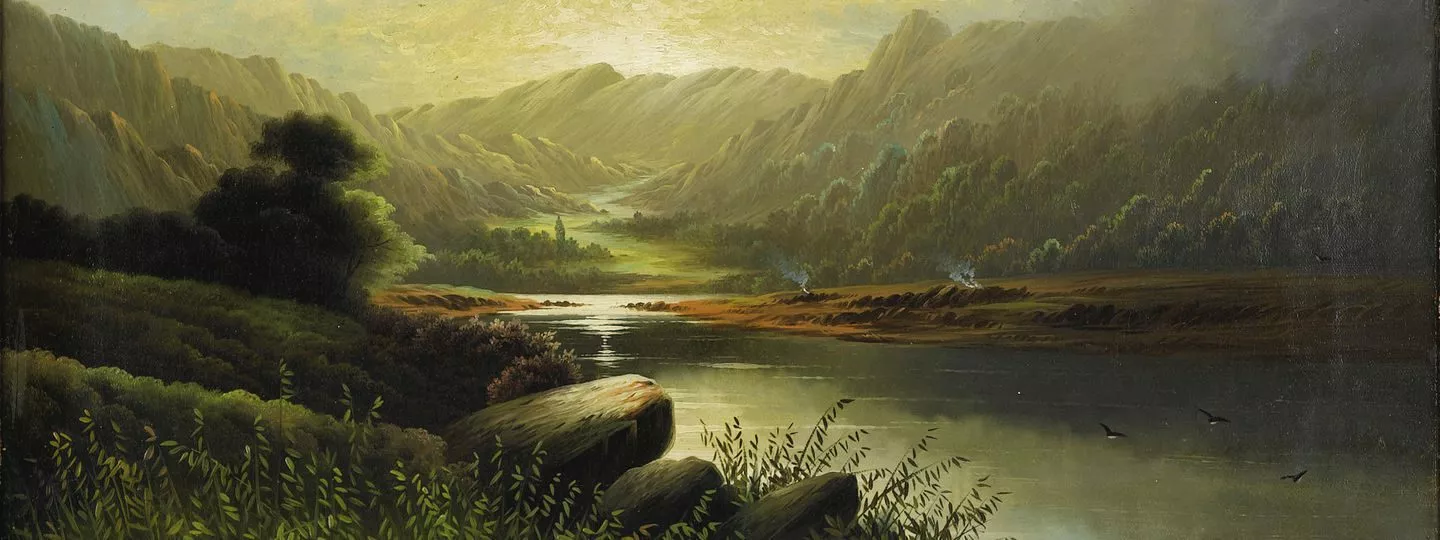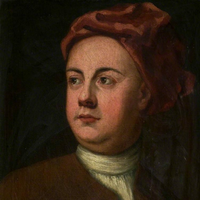
James Thomson
James Thomson (c. 11 September 1700– 27 August 1748) was a Scottish poet and playwright, known for his masterpiece The Seasons and the lyrics of “Rule, Britannia!”.
James Thomson (c. 11 September 1700– 27 August 1748) was a Scottish poet and playwright, known for his masterpiece The Seasons and the lyrics of “Rule, Britannia!”.
Scotland, 1700–1725
James Thomson was born in Ednam in Roxburghshire around 11 September 1700 and baptised on 15 September. He was the fourth of nine children of Thomas Thomson and Beatrix Thomson (née Trotter). Beatrix Thomson was born in Fogo, Berwickshire and was a distant relation of the house of Hume. Thomas Thomson was the Presbyterian minister of Ednam until eight weeks after Thomson’s birth, when he was admitted as minister of Southdean, where Thomson spent most of his early years.
Thomson may have attended the parish school of Southdean before going to the grammar school in Jedburgh in 1712. He failed to distinguish himself there. Shiels, his earliest biographer, writes: 'far from appearing to possess a sprightly genius, [Thomson] was considered by his schoolmaster, and those which directed his education, as being really without a common share of parts’. He was, however, encouraged to write poetry by Robert Riccaltoun (1691–1769), a farmer, poet and Presbyterian minister; and Sir William Bennet (d. 1729), a whig laird who was a patron of Allan Ramsay. While some early poems by Thomson survive, he burned most of them on New Year’s Day each year.
Thomson entered the College of Edinburgh in autumn 1715, destined for the Presbyterian ministry. At Edinburgh he studied metaphysics, Logic, Ethics, Greek, Latin and Natural Philosophy. He completed his arts course in 1719 but chose not to graduate, instead entering Divinity Hall to become a minister. In 1716 Thomas Thomson died, with local legend saying that he was killed whilst performing an exorcism. At Edinburgh Thomson became a member of the Grotesque Club, a literary group, and he met his lifelong friend David Mallet. After the successful publication of some of his poems in the ‘’Edinburgh Miscellany’’ Thomson followed Mallet to London in February 1725 in an effort to publish his verse.
London, 1725–1727
In London, Thomson became a tutor to the son of Charles Hamilton, Lord Binning, through connections on his mother’s side of the family. Through David Mallet, by 1724 a published poet, Thomson met the great English poets of the day including Richard Savage, Aaron Hill and Alexander Pope. Thomson’s mother died on 12 May 1725, around the time of his writing ‘Winter’, the first poem of ‘‘The Seasons’’. ‘Winter’ was first published in 1726 by John Millian, with a second edition being released (with revisions, additions and a preface) later the same year.
By 1727, Thomson was working on Summer, published in February, and was working at Watt’s Academy, a school for young gentlemen and a bastion of Newtonian science. In the same year Millian published a poem by Thomson titled ‘A Poem to the Memory of Sir Isaac Newton’ (who had died in March). Leaving Watt’s academy, Thomson hoped to earn a living through his poetry, helped by his acquiring several wealthy patrons including Thomas Rundle, the countess of Hertford and Charles Talbot, 1st Baron Talbot.
Later life, 1728–1748
He wrote Spring in 1728 and finally Autumn in 1730, when the set of four was published together as The Seasons. During this period he also wrote other poems, such as to the Memory of Sir Isaac Newton, and his first play, The Tragedy of Sophonisba (1729). The latter is best known today for its mention in Samuel Johnson’s Lives of the English Poets, where Johnson records that one 'feeble’ line of the poem - “O, Sophonisba, Sophonisba, O!” was parodied by the wags of the theatre as, “O, Jemmy Thomson, Jemmy Thomson, O!”.
In 1730, he became tutor to the son of Sir Charles Talbot, then Solicitor-General, and spent nearly two years in the company of the young man on a tour of Europe. On his return Talbot arranged for him to become a secretary in chancery, which gave him financial security until Talbot’s death in 1737. Meanwhile, there appeared his next major work, Liberty (1734).
In 1740, he collaborated with Mallet on the masque Alfred which was first performed at Cliveden, the country home of Frederick, Prince of Wales. Thomson’s words for “Rule Britannia”, written as part of that masque and set to music by Thomas Arne, became one of the best-known British patriotic songs - quite apart from the masque which is now virtually forgotten. The Prince gave him a pension of £100 per annum. He had also introduced him to George Lyttelton, who became his friend and patron.
In later years, Thomson lived in Richmond upon Thames, and it was there that he wrote his final work The Castle of Indolence, which was published just before his untimely death on 27 August 1748. Johnson writes about Thomson’s death, “by taking cold on the water between London and Kew, he caught a disorder, which, with some careless exasperation, ended in a fever that put end to his life”. He is buried in St. Mary Magdalene church in Richmond.
A dispute over the publishing rights to one of his works, The Seasons, gave rise to two important legal decisions (Millar v. Taylor; Donaldson v. Beckett) in the history of copyright.
Thomson’s The Seasons was translated into German by Barthold Heinrich Brockes (1745). This translation formed the basis for a work with the same title by Gottfried van Swieten, which became the libretto for Haydn’s oratorio The Seasons.
Memorials
Thomson is one of the sixteen Scottish poets and writers appearing on the Scott Monument on Princes Street in Edinburgh. He appears on the right side of the east face.
Editions
Thomson, James & Bloomfield, Robert, The Seasons & Castles of Indolence / The Farmer’s Boy, Rural Tales, Banks of the Wye, &c. &c., (London: Scott, Webster & Geary, 1842).
Gilfillan, Rev. George, Thomson’s Poetical Works, with Life, Critical Dissertation, and Explanatory Notes, Library Edition of the British Poets (1854).
Thomson, James. The Seasons, by... A New Edition. Adorned with A Set of Engravings, from Original Paintings. Together with an Original Life of the Author, and a Critical Essay on the Seasons. by Robert Heron, (Perth: R. Morison, 1793)
Thomson, James. Poems, edited by William Bayne, London: Walter Scott Publishing Co., [1900], (Series: The Canterbury poets).
Thomson, James. The Seasons, edited with introduction and commentary by James Sambrook, (Oxford: Clarendon Press, 1981) ISBN 0-19-812713-8.
Thomson, James. Liberty, The Castle of Indolence and other poems, edited with introduction and commentary by James Sambrook, (Oxford: Clarendon Press, 1986) ISBN 0-19-812759-6.
Bayne, William, Life of James Thomson, Edinburgh: Oliphant, Anderson and Ferrier, 1898, ("Famous Scots Series").
References
Wikipedia—https://en.wikipedia.org/wiki/James_Thomson_(poet,_born_1700)


